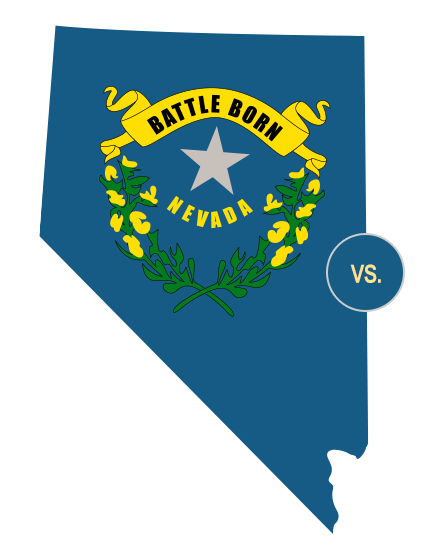
NCH's credit building program helped me to build a solid business credit score for my LLC from scratch and with zero prior knowledge about how it all works. The coaching team was fantastic and they really know their stuff.

Nevada is #1 in Lawsuit Protection
How Agencies Build & Report
Business Credit Scores
How Agencies Build & Report
Business Credit Scores
You don’t need to live in Nevada to enjoy the best asset and lawsuit protection a Nevada-registered business can provide


You know how your personal credit score is determined, but what about your business credit score? NCH can answer this question and provide you with the tools needed to build A+ business credit.
Business Credit Agencies
There are two business credit reporting agencies in the United States that lenders and financial institutions rely on for information to grant credit, Dun & Bradstreet and Experian.

- More than 70 million businesses are registered with D&B
- Uses info provided by business owners and vendors and grants a PAYDEX score based on the payment history
- Issues a DUNS rating based on the financial statements of the business
- Has a High-Risk status for companies that will destroy a company's ability to obtain credit

- More than 14 million businesses are registered with Experian
- The credit profile created by Experian uses info provided by vendors only
- Experian grants an Intelliscore based on payment history
- Experian is one of the three largest personal credit bureaus
Business Credit Scores
Business credit scores with D&B and Experian are where financial institutions look to determine credit:
| Credit Score | Score Range | Score Info | Report Factors | Factors |
|---|---|---|---|---|
| PAYDEX Score | Scores range from 0 to 100 | 75+ score is good | Based on payment experiences reported by vendors | Need 5 trade references who report to D&B |
| Intelliscore | Scores range from 0 to 100 | 75+ score is good | Based on payment experiences reported by vendors | Need 2 trade references who report to Experian |
| DUNS Rating | Various rating schedules | Based on employee size and financial statements | Also takes payment history into account | Based on payment experiences reported by vendors |
The following criteria are used by lenders when determining credit approval, limits, and interest rates for business loans:
- On-time bill payment history
- D&B DUNS rating
- D&B PAYDEX score
- Public records information
- Years in business
- Business tax returns
- Type of business
- Location of business
- Number of employees
- Business plan
- Trade references
- Banking references
- Accounts receivable aging reports
- Owner/officer credit score (can be overlooked depending on which lender is being used)
- Loan package – A formal presentation of everything above to present to the lender
What credit report lenders look for varies from lender to lender. Listed below are the most common reports used to determine credit. Keep in mind that these are only a guide and are not set in stone. Requirements change based on the amount of funding a lender has available at the time.
- D&B PAYDEX Score: PAYDEX score ranges are on a scale of 0-100 – should be 75+ to be in the low to medium risk of default
- D&B DUNS Rating: Varies based on financial statements and size (an ER, 1R or 2R rating only indicates employee size and does not indicate financial rating)
- Payment experiences for business
- Public information records
- Experian Intelliscore: Scale of 0-100 – a score of 75+ will put your business in a low to medium risk of default
- Experian FICO: FICO scores range from 300 to 850. You want a FICO score of 630+ to better your chances of approval
- All the above are personal credit reporting agencies
- All issue a FICO or Beacon score
- Equifax business credit reports containing the following information:
- Identification number for businesses
- Basic company information
- Financial information, including credit card details
- Payment history
- Public records
Got a Question? Start Here
Business credit scores measure an organization's creditworthiness based on financial history, payment habits, and business operations. Unlike personal credit scores that range from 300 to 850, business credit scores span from 0 to 100. A business owner's personal credit score does not affect the company’s credit rating.
There are three primary business credit bureaus: Dun & Bradstreet (D&B), Equifax, and Experian. Each credit bureau has its own criteria for measuring creditworthiness. D&B's PAYDEX score focuses primarily on credit history. Conversely, Equifax uses the data collected by the Small Business Finance Exchange (SBFE). Lastly, Experian's scores are based on credit information from suppliers and other creditors.
To improve your business's PAYDEX score and Intelliscore, you must first pay your bills on time or early. You can also ask your other vendors who don't report to D&B and Experian to submit their trade experiences with you. This way, your number of on-time payments will increase.
DUNS ratings are primarily based on several factors, including your organization's payment history, credit utilization, and financial stability. Dun & Bradstreet also checks public records to see if your business has had any public filings and other adverse legal events in recent years. These components could make or break your company's creditworthiness.
You can access your business credit reports online. Some major business credit bureaus and providers, like Dun & Bradstreet's Credit Signal and Nav Marketplace, offer free reports. However, these free reports are less detailed than their paid counterparts. If you want a complete breakdown of your credit rating, a paid business credit report package is best.
Call for a FREE consultation at 1-800-508-1729.
NCH can provide you with a complete profile of all your credit scores, including a composite score analyzing several criteria that a lender will look at. We can also help you build and improve your personal credit scores.
For more information on building business credit, please call 1-800-508-1729 to speak with a business credit expert at NCH.
Free Consultation
Speak With a Business Expert
Related Articles:

Find out why Nevada is the best place to start your business regardless of where you live.
 24 Hour LLC Guarantee
24 Hour LLC Guarantee




